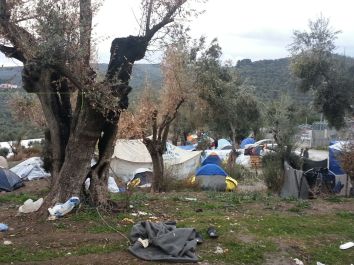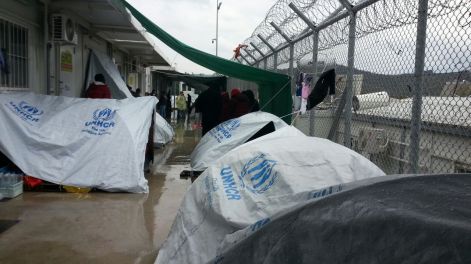OpenTheIslands Network – The situation for refugees in Lesvos remains critical. As weather conditions worsen and winter approaches, Moria camp still ‘houses’ three times more people than capacity allows. With a capacity of around 2300 people, Moria camp now has almost 7000 people inside. From the promised 5000 transfers to the mainland until December 15th only a few hundred actually happened so far. If and how it will be possible to transfer several thousand people in the next five days is a questions yet to be answered.
The population of Moria camp includes around 350 unaccompanied minors, many children with their families, pregnant women, severly sick and disabled people. They are living in flimsy summer tents, without even a mattress, not protected from rain, wind or cold.
Images and footage showing the inhumane and unacceptable living conditions in Moria have been reported in local, national and international media.1
On 8 December, the Greek government stated its intention to move 5000 people from the islands to the mainland by December 15th. This comes one week after the promise to move 3000 people from Lesvos to the mainland by 15 December. At the time of writing, only a few hundred people from the promised 3000 had left the island. 408 people departed from Lesvos Friday/Saturday and 265 on Sunday evening to Piräus. 256 people were brought to Crete.
People are getting sick because of the unhygienic living conditions and the worsening weather conditions but also because of the uncertainity and malfunctioning asylum system. Incidents of self-harm and suicide attempt have been going up, as reported by MSF2. Although for example MSF has set up a mobile emergency clinic outside Moria for pregnant women and minors there are very severe gaps in the health care that is available for refugees.
A further major challenge is the access to quality legal aid during the asylum procedure. Legal aid actors have decreased their operations and there are not enough legal aid providers and Greek lawyers in the island for the over 8000 refugees currently staying in Lesvos. Many refugees do not receive information about the asylum procedure and have to go to their interviews completely unprepared. If asylum seekers case is rejected they have – in theory- the right to a free lawyer to support them in appealing the decision. In practice though, there are only very few Greek lawyers and the ones that are appointed to people often do not meet with their clients in person or even don’t speak to them at all. Therefore people have to file appeals without being able to submit more evidence that supports their claim. On Lesvos, only 1% of the appeals are accepted. Therefore applicants that actually have the legal right to international protection will be rejected and face deportation to a country where they might face persecution.
Deportations to Turkey continue with 5-20 people being deported every week from Lesvos. On 23rd of November, solidarity groups and lawyers prevented the deportation of two people to Turkey in the last minute. Although this is a success, most people in detention have no sufficient access to legal aid nor other basic services. Very few lawyers take cases of detainees and the ones who do have limited times consulting with their clients and are often interupted by the police in the prison. Especially the people who are detained directly upon arrival and kept during their entire asylum procedure have almost no access to any kind of support not to speak of access to a fair asylum procedure.
1 For example http://www.aljazeera.com/news/2017/11/greeces-lesbos-guantanamo-bay-europe-refugees-171129134253661.html
2http://www.msf.org/en/article/greece-eu-border-policies-fuel-mental-health-crisis-asylum-seekers
This article was first published by the OpenTheIsland Network

